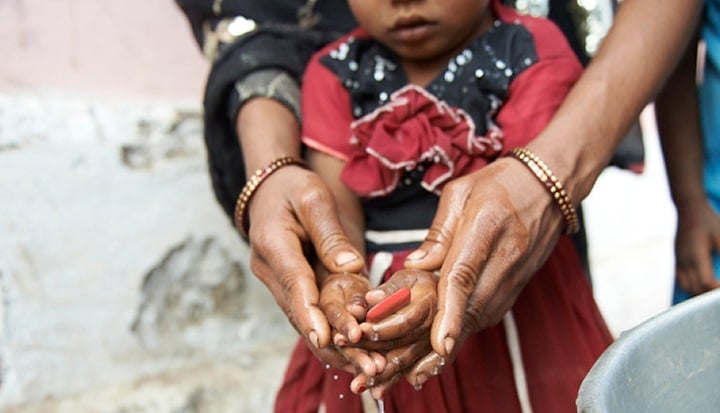There are some issues in the world that are so big, so entrenched, so important, that we cannot afford to leave them to any one type of organisation to address. Two million children every year not living to reach their fifth birthday because of diarrhoeal disease and pneumonia is one such issue. Each death is a family tragedy. But two million deaths keeps communities trapped in poverty and stifles development. As a global community, we cannot afford to leave the responsibility for addressing issues like this to governments and aid organisations alone. Business must play its part too.
For a business like Lifebuoy – the world’s biggest health soap brand and biggest advocate for handwashing with soap, the life-saving habit that can halve those two million premature deaths – this is our mission. To play our part and stop children dying from preventable diseases and help them reach their fifth birthday.
It is also our opportunity. By doing good, our business does well. Squaring the commercial circle is what makes our commitment to this cause sustainable. Sustainable for the commercial organisation that every business is, and sustainable beyond the personal motivations and commitment of the individuals who work for the business. It also takes our mission beyond the confines of conventional Corporate Social Responsibility – we do this not out of a sense of guilt or as a charity, we do this because when we do good for society it is also good for our business. The Lifebuoy brand was developed to help bring affordable hygiene to Victorian England at a time when epidemics of cholera were a constant threat so this balancing profit with responsible corporate behaviour has always been a mission at the heart of Lifebuoy’s business.
As a brand, we are better placed than generic campaigns to effect behaviour change. People pay attention to brands, not categories. When a woman goes into a shop, she doesn’t ask to buy a soap, she asks for Dove or Lux or Lifebuoy. Think Coca Cola, Apple, Google; brands have long been powerful agents to change our habits and behaviours. To think that brands don’t equally change habits and behaviours in poorer communities is to fail to understand human nature, and to waste a golden opportunity to bring about positive changes in society.
Brands also know how to tell stories that reach people. Two million children not reaching their fifth birthday is a statistic. An appalling, terrible, unspeakable statistic, but a statistic all the same. One child not reaching his fifth birthday is a tragedy, and an individual story that can move us. We tell one such story in our Gondappa Help a Child Reach 5 campaign – a powerfully emotional story of one man’s journey which has already moved millions of people, from ordinary citizens to presidents, business leaders to health professionals. One viewer was Bollywood icon, Kajol, whose reaction to the film was so profound that she asked to join our campaign, and went recently to the United Nations to campaign for handwashing to be made part of the new Millennium Development Goals.
Ultimately, the commercial and social drivers of what we do cannot be separated. That is what makes our campaign, and others like it, so powerful and sustainable. That’s why we put social purpose at the heart of our business, not sitting to the side as CSR or philanthropy.
Having a social purpose brings our brand greater exposure and attention; it builds our brand and helps us develop new markets; it attracts and retains talent in our business and it creates a sustainable, profitable business. But most of all, it unleashes the potential of a brand to do good in communities, potential that would otherwise be wasted.
It has brought us into partnership with many organisations – global, national and local – who share a commitment to this cause. We work with global bodies like USAID, WSUP and PSI and at a community level with smaller NGO partners who can help take the campaign to hard-to-reach areas. And we do this proud of our brand’s values and identity as without these ingrained values there can be no long term commitment to the handwashing programmes.
Lifebuoy can audaciously declare that we want to directly change the handwashing habits of a billion people and live to tell the tale – see Exhibit A: we have already changed the handwashing habits of 130 million people in the last three years and we aren’t going to stop until we reach a billion. We have made an impact on communities which is measurable (witness the huge reduction in diarrhoea incidence in Thesgora, the village in central India that we adopted in February) and we have grown our business handsomely in the last three years. Doing well by doing good is a virtuous circle that will hopefully continue.
Brands are one of the best levers to effect change, and those responsible for communities (nationally and globally) owe it to them to use these levers to help bring about positive change. Businesses for their part need to make the case for addressing social issues unapologetically, both through active lobbying of governments and through public advocacy like this forum.
If you are inspired by Gondappa’s story, then raise your voice to make the case for business enthusiastically embracing a social purpose.
Twitter: @smrsngh
This blog is one in a five-part series with Unilever-Lifebuoy.
Click here to donate to the Lifebuoy Help a Child Reach 5 Campaign.











One Response
When a company can embrace humanitarian aspects to the marketplace as conveyed by the above article, then we are one step closer to a true civil society.I would like to have this company as a partner with the work I do in Africa.